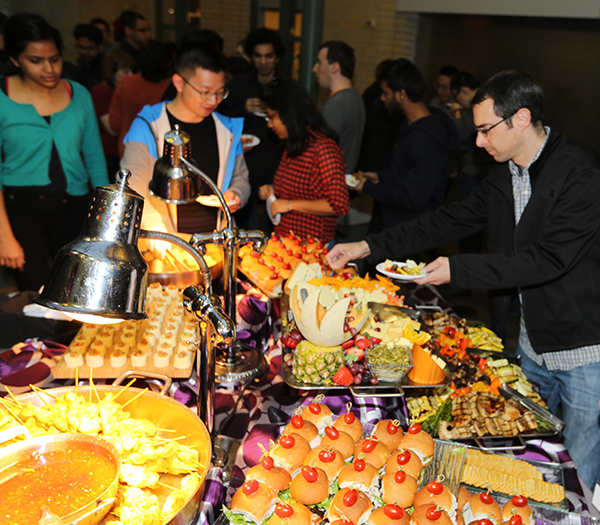Transforming Hollywood Visual Effects with Graphics and Vision
Abstract: Paul will describe his path to developing visual effects technology used in hundreds of movies, including The Matrix, Spider-Man 2, Benjamin Button, Avatar, Maleficent, Furious 7, and Blade Runner: 2049. These techniques include image-based modeling and rendering, high dynamic range imaging, image-based lighting, and high-resolution facial scanning for photoreal digital actors. Paul will also [...]
Vision without labels
Abstract: Deep learning has revolutionized all aspects of computer vision, but its successes have come from supervised learning at scale: large models trained on ever larger labeled datasets. However this reliance on labels makes these systems fragile when it comes to new scenarios or new tasks where labels are unavailable. This is in stark contrast to [...]
RI Faculty Business Meeting
Meeting for RI Faculty. Discussions include various department topics, policies, and procedures. Generally meets weekly.
Learning Meets Gravity: Robots that Learn to Embrace Dynamics from Data
Abstract: Despite the incredible capabilities (speed and repeatability) of our hardware today, many robot manipulators are deliberately programmed to avoid dynamics – moving slow enough so they can adhere to quasi-static assumptions of the world. In contrast, people frequently (and subconsciously) make use of dynamic phenomena to manipulate everyday objects – from unfurling blankets, to [...]
Large Multimodal (Vision-Language) Models for Image Generation and Understanding
Abstract: Large Language Models and Large Vision Models, also known as Foundation Models, have led to unprecedented advances in language understanding, visual understanding, and AI. In particular, many computer vision problems including image classification, object detection, and image generation have benefited from the capabilities of such models trained on internet-scale text and visual data. In [...]
RI Faculty Business Meeting
Meeting for RI Faculty. Discussions include various department topics, policies, and procedures. Generally meets weekly.
Learning and Control for Safety, Efficiency, and Resiliency of Embodied AI
Abstract: The rapid evolution of ubiquitous sensing, communication, and computation technologies has revolutionized of cyber-physical systems (CPS) across virous domains like robotics, smart grids, aerospace, and smart cities. Integrating learning into dynamic systems control presents significant Embodied AI opportunities. However, current decision-making frameworks lack comprehensive understanding of the tridirectional relationship among communication, learning and control, [...]
Generalizable Dexterity with Reinforcement Learning
Abstract: Dexterity, the ability to perform complex interactions with the physical world, is at the core of robotics. However, existing research in robot manipulation has been focused on tasks that involve limited dexterity, such as pick-and-place. The motor skills of the robots are often quasi-static, have a predefined or limited sequence of contact events, and [...]
Imaginative Vision Language Models: Towards human-level imaginative AI skills transforming species discovery, content creation, self-driving cars, and emotional health
Abstract: Most existing AI learning methods can be categorized into supervised, semi-supervised, and unsupervised methods. These approaches rely on defining empirical risks or losses on the provided labeled and/or unlabeled data. Beyond extracting learning signals from labeled/unlabeled training data, we will reflect in this talk on a class of methods that can learn beyond the vocabulary [...]
World Knowledge in the Time of Large Models
Abstract: This talk will discuss the massive shift that has come about in the vision and ML community as a result of the large pre-trained language and language and vision models such as Flamingo, GPT-4, and other models. We begin by looking at the work on knowledge-based systems in CV and robotics before the large model [...]
Data-Efficient Learning for Robotics and Reinforcement Learning
Abstract: Data efficiency, i.e., learning from small datasets, is of practical importance in many real-world applications and decision-making systems. Data efficiency can be achieved in multiple ways, such as probabilistic modeling, where models and predictions are equipped with meaningful uncertainty estimates, transfer learning, or the incorporation of valuable prior knowledge. In this talk, I will [...]
RI Faculty Business Meeting
Meeting for RI Faculty. Discussions include various department topics, policies, and procedures. Generally meets weekly.
Digital Human Modeling with Light
Abstract: Leveraging light in various ways, we can observe and model physical phenomena or states which may not be possible to observe otherwise. In this talk, I will introduce our recent exploration on digital human modeling with different types of light. First, I will present our recent work on the modeling of relightable human heads, [...]
Preference Based Optimization of Multi-Objective Robot Performance
Abstract: Robotic systems often require that tradeoffs be made--for example, between performance and robustness, power and longevity, or efficiency and safety. While roboticists can design cost functions with hand-picked weights for different metrics, it is not always a straightforward task, particularly when some aspects of performance are not easily quantified. This can occur especially when [...]
Dynamic 3D Gaussians: Tracking by Persistent Dynamic View Synthesis
Abstract: We present a method that simultaneously addresses the tasks of dynamic scene novel-view synthesis and six degree-of-freedom (6-DOF) tracking of all dense scene elements. We follow an analysis-by-synthesis framework, inspired by recent work that models scenes as a collection of 3D Gaussians which are optimized to reconstruct input images via differentiable rendering. To model [...]
RI Faculty Business Meeting
Meeting for RI Faculty. Discussions include various department topics, policies, and procedures. Generally meets weekly.
Ensuring safety for uncertain high-dimensional robotic systems
Abstract: Two major obstacles for safe control and planning are (1) scaling to high-dimensional systems and (2) handling uncertain systems. This is problematic because such systems are ubiquitous in practice: e.g. drones with unknown drag, manipulators carrying unknown packages. In this proposal, we aim to address both challenges. At the control level, we have synthesized [...]
Trustworthy Learning using Uncertain Interpretation of Data
Abstract: Non-parametric models are popular in real-world applications of machine learning. However, many modern ML methods that ensure that models are pragmatic, safe, robust, fair, and otherwise trustworthy in increasingly critical applications, assume parametric, differentiable models. We show that, by interpreting data as locally uncertain, we can achieve many of these without being limited to [...]
Allocation, Planning, and Control in Off-road Automated Convoy Operations
Abstract: The lack of structure in off-road terrains makes off-road operations of automated platforms difficult. The difficulty arises from uncertainty in the optimality and safety of the actions (e.g., planning and control) taken by the automated platform. When multiple automated platforms are required to act in a coordinated manner (e.g., a convoy) in complex cluttered [...]
Robot Learning for Assistive Dressing
Abstract: Robot-assisted dressing could benefit the lives of many people such as older adults and individuals with disabilities. In this talk, I will present two pieces of work that use robot learning for this assistive task. In the first half of the talk, I will present our work on developing a robot-assisted dressing system that [...]
RI Faculty Meeting: Multi-Robot Field Autonomy: A 5 Year Perspective
LIVE DEMO! Come see, hear and witness progress made in developing a heterogeneous (wheeled, legged, etc.) team of field deployable mobile robots. Details will be shared on the history of development of multi-robot autonomy at CMU throughout the previous DARPA Subterranean Challenge, DARPA RACER program, and current ARL projects. There will be an ongoing live and interactive [...]
RI Faculty Business Meeting
Meeting for RI Faculty. Discussions include various department topics, policies, and procedures. Generally meets weekly.
Robots at the Johnson Space Center and Future Plans
Abstract: The seminar will review a series of robotic systems built at the Johnson Space Center over the last 20 years. These will include wearable robots (exoskeletons, powered gloves and jetpacks), manipulation systems (ISS cranes down to human scale) and lunar mobility systems (human surface mobility and robotic rovers). As all robotics presentations should, this [...]
Biometrics in a Deep Learning World
Abstract: Biometrics is the science of recognizing individuals based on their physical and behavioral attributes such as fingerprints, face, iris, voice and gait. The past decade has witnessed tremendous progress in this field, including the deployment of biometric solutions in diverse applications such as border security, national ID cards, amusement parks, access control, and smartphones. [...]
Towards Robotic Tree Manipulation: Leveraging Graph Representations
Abstract: There is growing interest in automating agricultural tasks that require intricate and precise interaction with specialty crops, such as trees and vines. However, developing robotic solutions for crop manipulation remains a difficult challenge due to complexities involved in modeling their deformable behavior. In this study, we present a framework for learning the deformation behavior [...]
Tracking Any”Thing” in Videos
Abstract: Being able to track anything is one of the fundamental steps to parse and understand a video. In this talk, I will present two pieces of work that tackle this problem at different spatial granularities. In the first half of the talk, I will discuss tracking any video pixel or particle through time in [...]
Exploring Diverse Interaction Types for Human in the Loop Robot Learning
Abstract: Teaching sessions between humans and robots will need to be maximally informative for optimal robot learning and to ease the human’s teaching burden. However, the bulk of prior work considers one or two modalities through which a human can convey information to a robot—namely, kinesthetic demonstrations and preference queries. Moreover, people will teach robots [...]
Learning Generalizable Robot Skills for Dynamic and Interactive Tasks
Abstract: Enabling robots to perform complex dynamic tasks such as picking up an object in one sweeping motion or pushing off a wall to quickly turn a corner is a challenging problem. The dynamic interactions implicit in these tasks are critical for successful task execution. Furthermore, given the interactive nature of such tasks, safety, in [...]
Customizing Large-scale Text-to-Image Models
Abstract: Advancements in large-scale generative models represent a watershed moment. These models can generate a wide variety of objects and scenes with different styles and compositions. However, these models are trained on a fixed snapshot of available data and often contain copyrighted or private images. This assumption makes them lacking in two aspects – (a) [...]
Building Robot Hands and Teaching Dexterity
Abstract: Our shared dream is to have robot humanoids with hands complete similar tasks that humans do. While there are a few robot hands available today, the popular opinion is that they are difficult to use, expensive, and hard to obtain which precludes their ubiquitous usage. We argue that this is not an inherent problem [...]
Neural World Models
Abstract: Computer vision researchers have pushed the limits of performance in perception tasks involving natural images to near saturation. With self-supervised inference driven by recent advancements in generative modeling, it can be debated that the era of large image models is coming to a close, ushering in an era focused on video. However, it's worth [...]
How to Design Robotic Hands That Wield Tools
Abstract: Tool manipulation is an essential human skill. It extends our manipulation capability beyond the capability of the biological hand, and is a defining feature of many important jobs centered on physical interaction with the real world. Yet, wielding a tool is drastically different from generally grasping an object. The prime examples are pens and [...]
Becoming Teammates: Designing Assistive, Collaborative Machines
Abstract: The growing power in computing and AI promises a near-term future of human-machine teamwork. In this talk, I will present my research group’s efforts in understanding the complex dynamics of human-machine interaction and designing intelligent machines aimed to assist and collaborate with people. I will focus on 1) tools for onboarding machine teammates and [...]
Robotics Institute Winter Party
Please join us for some fun, food, beverages and conversation! All RI faculty, staff, students and visitors are invited to the Robotics Institute Winter Party! We apologize but due to space limitations in the Atrium we regretfully cannot include family or other non-RI guests.

























